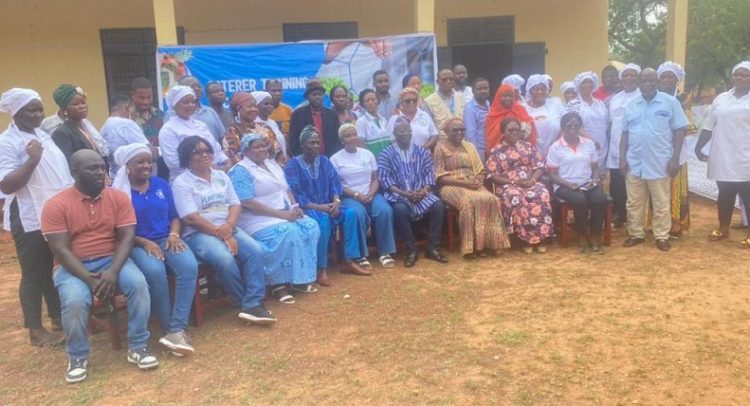WFP with GES and other stakeholders at Tolon
The World Food Programme (WFP) with support from the Rockefeller Foundation is implementing a half-year ‘Catalyzing Good Food Through School Feeding Program’ project to promote the use of healthier nutritious foods in schools to help school children obtain optimum nutritional benefits from school meals.
The project is in partnership with Ghana Education Service (GES), Ghana School Feeding Program (GSFP), and National Buffer Stock Company (NAFCO) among others to optimize school menus and improve the quality of school meals through parboiling and fortification.
The WFP together with the Ghana Education Service has selected six primary schools and six senior high schools within Bolgatanga, Kaena Nankena, Tolon, Ejisu, and Shai-Osudoku districts for the implementation of this pilot project.
According to the World Food Programme, in ensuring that school children are served safe and nutritious meals for their growth and development, they are supporting efforts to improve the capacities of school matrons, caterers, and cooks on the use of parboiled unpolished rice.

Some matrons and cooks undergoing the caterer and cooking training in Tolon
As part of the project, matrons and cooks in the various schools have been trained in caterer training and cooking demonstrations.
“We seek to also expose school caterers to new recipes and a variety of dishes that can be prepared using parboiled unpolished rice. Various dishes will be prepared from parboiled unpolished rice and presented for tasting. We want to improve the knowledge on cooking methods that guarantee safe and nutritious school meals as well as improve their skills in proper food handling, nutrition, food quality, and safety among others”.
The WFP hopes to improve the awareness, knowledge, and capacities of at least 96 caterers, cooks, and matrons of the partner schools as well as nutrition and SHEP officers on the use of parboiled unpolished rice and rice fortification.
“This effort to strengthen the capacities of school caterers to serve fortified parboiled unpolished rice and other local nutritious foods through this project presents an opportunity to directly impact and address the micronutrient needs of over 1.7 million school children.
While improving education, health, and nutrition outcomes, we expect to have local rice value chain actors empowered to ensure sustainable livelihoods for over 4.8 million small-scale farmers, food processors, caterers, and other indirect beneficiaries within the project communities”.
The Programme Policy Officer, WFP, Madam Emma Anaman, said the caterer and cooking demonstration at the various schools is to showcase the importance and how parboiled publish rice can be nutritious for the pupils.
“ Studies have proved that parboiled unpolished rice has a lot of nutrients that will promote healthy bodies, growth, and brain development for the children”.
She indicated that Micronutrient deficiency is very high in the northern region, especially with iron anemia deficiency, and that the solution is the parboiled unpolished rice which is grown by our farmers and local food processors.
Madam Anaman disclosed that the World Food Programme is collaborating with the Ministry of Agriculture and the Ghana Education Service to promote school gardening.
“ If the schools are promoting school gardening and growing onions, pepper, tomatoes, and other vegetables, these could complement what is provided by the government and the children also get to learn about agriculture which could change the mindset of the children and that could interest them to venture into agriculture”.
The Programme Policy Officer of the World Food Programme noted that they are piloting the project in some selected schools and that depending on the results after the assessment will determine if they should implement it on a full scale.
“While improving the nutritional and micronutrient status of the Ghanaians, we remain committed to collaborating strongly to transform the food systems to deliver better healthy diets and employment, especially for women and youth. WFP is providing support to identified local rice producers and millers to enable them to produce and fortify healthy and climate-resilient rice. These processors will supply to NAFCO and caterers of the GSFP for consumption in both the primary and SHS”.
The Northern Regional Director of Education, Hajia Katumi Natogmah, expressed her excitement about the introduction of the parboiled unpolished rice adding that it will go a long way to improve the nutritional levels and development of the children.
“ Those who cook handle the food and it’s not that the food doesn’t contain the nutrients but sometimes if you over you destroy the nutrients and if you don’t handle the raw food well you can lose a lot of nutrients in them so they are here to teach and educate them on how to cook and retain these nutrients so that the school children will not lack any nutrients if they are taking in the food they have cooked,” she said.
BY Eric Kombat, Tolon


